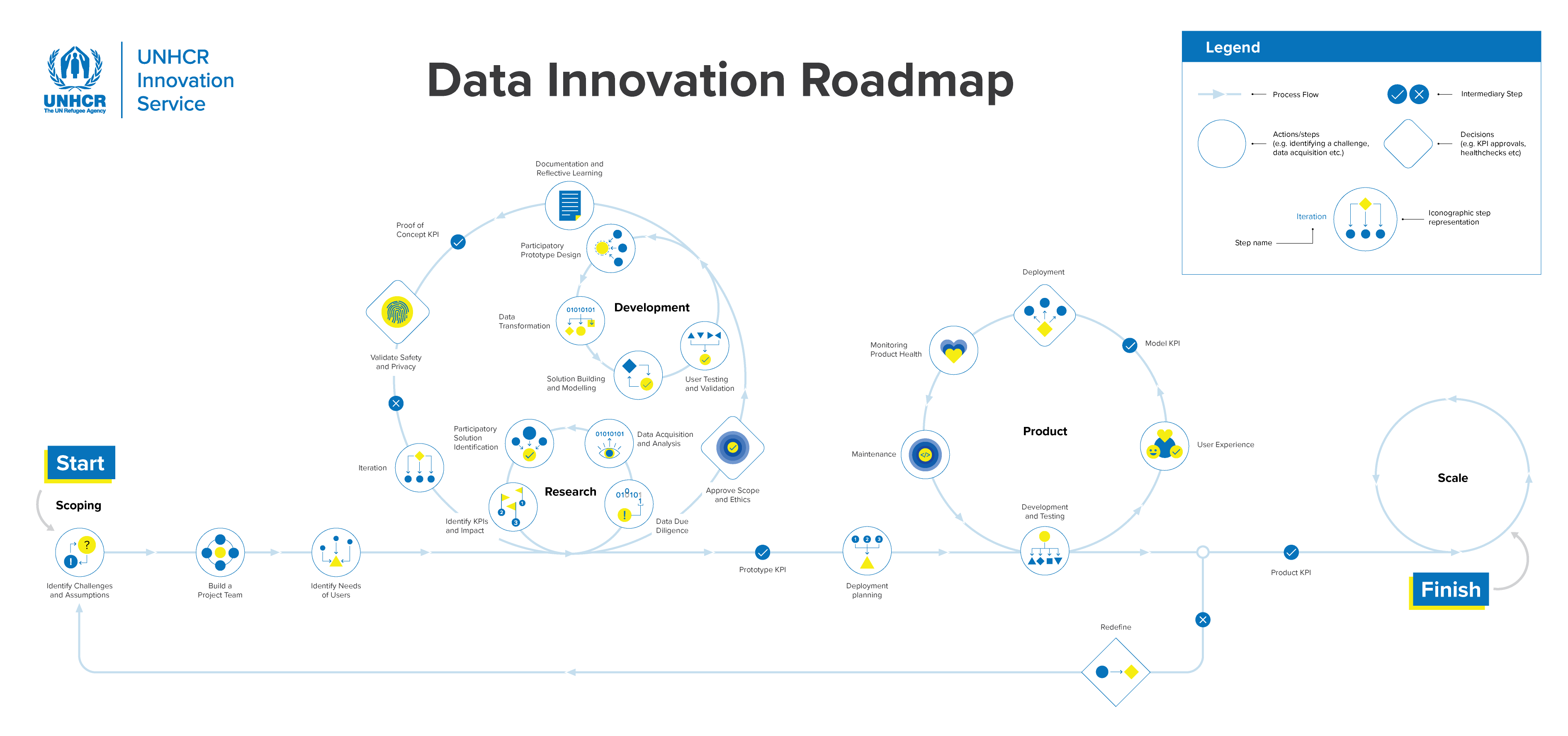Our vision
We’re building a culture of innovation to ensure UNHCR can responsibly and creatively take advantage of big data analytics, AI, intelligent automation, and other exponential technologies to further our mandate.
Our approach
The industry of new information and communication technologies is rapidly advancing, but is still nascent in many areas, and not yet fully tested in society. The humanitarian sector faces a challenge of how to adopt nascent technologies while exploring how to use them to support the delivery of the UNHCR protection mandate in a way that complies with UN policies, human-rights based approaches, and humanitarian and ethical standards.
UNHCR’s Data Innovation programme is inspired and in support of creating evidence for the advancement of the UN Secretary General Digital Roadmap, the UN Secretary General Data Strategy 2020-2022 and the UNHCR Data Transformation Strategy 2020-2025.
This programme works to innovate, experiment and leverage data in new and creative ways to improve UNHCR’s work and the lives of the people it serves. Innovative solutions include ethics and human rights-based approaches, responsible data practices, evidence-based humanitarian decision making, and privacy-enhancing technologies that can shape the future of the humanitarian sector.
Data Innovation Fund
The Data Innovation Fund provides targeted financial and technical support to colleagues in UNHCR who are interested in exploring innovation methodologies in combination with data science and other non-traditional analysis techniques, or exploring emerging technologies to perform data analysis in more creative ways.
The Data Innovation Roadmap
The Data Innovation Programme nurtures innovative, ethical approaches to data and emerging technology using the Data Innovation Roadmap. The Roadmap is a bespoke practical guide through the process of data innovation in humanitarian contexts, ensuring a rigorous engagement with data science, data engineering, and innovation methodologies.
Through both a visual map and a guiding document, it lays out the different stages that data innovation initiatives should go through – scoping, research and development, production, and scale – and the tools, methodologies, and deliverables required to advance from one stage to the next. You can explore the Roadmap here:
Our past projects
The Innovation Service’s work on big data and artificial intelligence takes many forms, including support and services to UNHCR operations, training on bias ethics and a human-rights based approach, partnering with non-traditional actors to explore creative approaches, and holistic support to nurture pilots breaking new ground. Here’s a glimpse into some of this work:
Stories
The Innovation Service’s Data Innovation team uses narratives and stories to bring insight and learnings into its work, collaboration alongside colleagues and refugees and how the team imagines the future of data in the humanitarian sector. You can find our latest articles here.
Research and publications
A collection of research, insights, and publications from at the crossroads of data innovation and humanitarian response to learn how UNHCR navigates challenges and is thinking about the role of data innovation in its work with refugee communities.
Technical guidance
Key technical resources to support UNHCR’s data and artificial intelligence work, from the practical “how-tos” to due diligence, technical guidance, and policy.
Additional resources
Further resources to inform UNHCR’s Data Innovation work.
FAQs
A list of some of our most frequently asked questions on the Innovation Service’s data and artificial intelligence work.
What is UNHCR Innovation Service’s Data Innovation work focused on?
How is the Innovation Service’s work different from UNHCR’s Global Data Service (GDS) and/or the Joint World Bank-UNHCR Data Center (JDC)
Why are big data and artificial intelligence relevant to the UN Refugee Agency?
Does the Innovation Service collaborate with partners on big data and AI?
- Academia: University of Essex Human Rights, big data and Technology (HRBDT) initiative, University of Brunel (Hidalgo Project on Computer Simulation in refugee settings)
- Non-profit sector: Danish Refugee Council (DRC)-IBM collaboration on predictive analytics
- Collaborative platforms: such as Omdena Foundation, R-Ladies Ecuador,
- Government collaborations: DFID Data Science Teams in humanitarian sector working group
- Private sector: GSMA AI for Impact Advisory panel
- Other UN agencies: UN Inter-agency working group on artificial intelligence (IAWG-AI), UNHCR-World Bank Joint Data Centre (JDC) Advisory Council, UN Global Pulse, OCHA Predictive Analytics team, Humanitarian Data Science & Ethics Group (DSEG), ITU Artificial Intelligence for Good Summit.
- Persons of concern: Refugees, stateless persons, asylum seekers and internally displaced people have helped us to design projects or to adapt them according to their feedback.
How can we collaborate, engage or know more about this area of work?
What types of technologies have you worked with?
What are some options for qualitative data analysis or text analysis? What tools do you recommend?
What if I have other questions I need answered?
Contact
Are you working on big data, artificial intelligence and other exponential technologies and displacement or related human-rights or ethics work, and you have interesting perspectives to share? Do you have questions or want to support our work? Get in touch at innovation@unhcr.org

